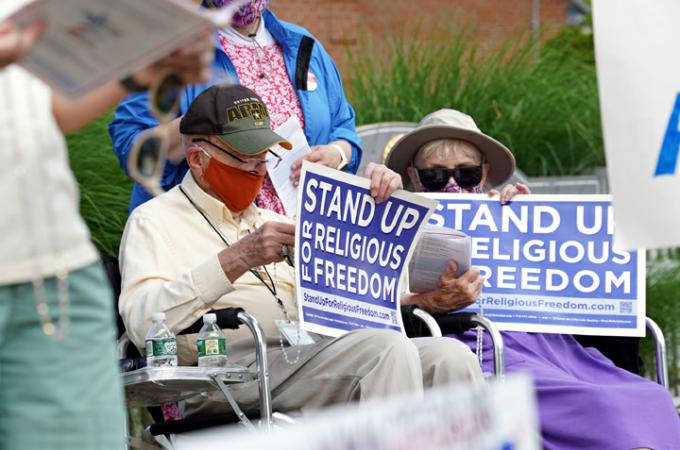The problem of political theologians
Some say religious leaders get too involved in politics. But we should also worry about politicians who wander into theology.
One example comes from Gov. Ralph Northam of Virginia, while announcing new restrictions on social gatherings due to growing COVID-19 cases.
To justify placing further restrictions on church services, he urged religious leaders to realize what is most important. "Is it the worship or the building? For me, God is wherever you are. You don't have to sit in the church pew for God to hear your prayers. Worship with a mask on is still worship. Worship outside or worship online is still worship."
To be sure, Gov. Northam has not acted on his opinion, because the Supreme Court recently invalidated a similar effort to close churches in New York. For now, Virginians can still attend church if they follow strict protocols for wearing masks, social distancing and so on.
But a government official seemed to be lecturing people of faith on what constitutes worship.
Of course God can hear our prayers wherever we are. But Christian tradition has generally not seen individual prayer as an adequate substitute for the Third Commandment's call to come together in worship.
Catholics, especially, have a communal and sacramental faith, as the Catechism of the Catholic Church observes (Nos. 2177-83). When we gather for Mass, we are more fully the church, and we receive the body and blood of Jesus Christ to help us live as members of his body. To quote Archbishop Salvatore J. Cordileone of San Francisco, "The sacraments as we Catholics understand them cannot be livestreamed."
Just as Israelites saw the whole chosen people as being in covenant with God, we Catholics believe that our bond with the church founded by Christ supports and guarantees the authenticity of our individual faith. At every Mass we pray to God: "Look not on our sins but on the faith of your church."
Another narrowing view of religion recently came to light when President-elect Joe Biden announced his plan to nominate Xavier Becerra as secretary of Health and Human Services. As attorney general of California, Becerra has worked to force the Little Sisters of the Poor to provide coverage for contraceptive and abortifacient drugs, supported a state law to require private health insurance to cover unlimited abortion and tried to require pro-life pregnancy aid centers to make abortion referrals.
In 2017, at a confirmation hearing for his position as attorney general, Becerra insisted that "the protection for religious freedom is for the individual" as opposed to "protections you are giving to some institution or entity who is essentially bootstrapping the First Amendment protections on behalf of somebody else." So much for the central importance of a communal faith.
Becerra's view leads him to deny religious freedom to religious orders and other groups with moral convictions about human life. But our highest court has repeatedly corrected him, saying that individual and institutional rights are not easily separated.
The Supreme Court has upheld the religious liberty not only of the Little Sisters, but even of for-profit companies like Hobby Lobby owned by believers, saying that such protection "protects the religious liberty of the humans who own and control those companies." The court also invalidated California's abortion referral mandate for pro-life centers, saying it attacked the centers' First Amendment right of free speech.
I'm grateful that Gov. Northam has not enacted his opinion on the nature of faith into civil law. Far more ominous is the prospect that another official, with little understanding of or sympathy for institutional religious freedom, may soon exert great power over the Catholic clinics and hospitals that are so vital a part of our national health care system.
- Richard Doerflinger worked for 36 years in the Secretariat of Pro-Life Activities of the U.S. Conference of Catholic Bishops. He writes from Washington state.



















